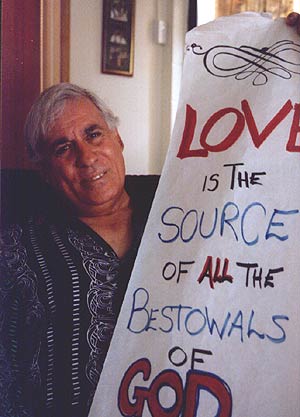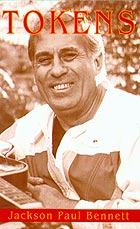BAFA © 2010. All material here is copyrighted. See conditions above. |
Paul Bennett
singer, Aotearoa / New Zealand
|

Paul Bennett in his home with one of his "Fireside" posters.
Photo: Sonja van Kerkhoff, 2002.
|
I was born in New Zealand in 1942, moving to Australia when I was 19 years old. Dad used to sing a bit. Music was always around. I got into professional music in the late fifties when I was 16 or 17, in a duo act with the Australian Aboriginal, Garth Terate, who also taught me the guitar. Then I was in the band 'The Maui Troubadours' (Maui is a clever, prophetic and inventive character from New Zealand Maori mythology). The leader and main vocalist was Prince Tui Teka. We toured Australia and New Zealand in the early sixties and while we were in New Zealand in 1962, I stayed on performing solo in clubs and doing odd jobs.
I have a bass baritone voice and had lessons in the early '70's from an opera singer for 3 months. Once you learn to breathe through your diaphram, you can sing forever. I went full-time as a musician in 1970 and spent most of my 30 year career based in the Auckland area. I met Bryce Peterson a singer/songwriter and Bahá´í in 1974 and it wasn't long before I also was a Bahá´í. We performed together for about 20 years doing mostly children's shows. It was fun but didn't pay. I supported myself with club work.
Over the years I have met many interesting people on my tours and travels as a musician.
|
One was the New Zealand writer, Barry Crump. He told great stories and his firesides were literal. We'd sit around a fire. He was a bushman and lived his life in the bush and so when he became famous he found the interest in his life difficult. The book that is most known would be "A Good Keen Man" which is based on rugged, eccentric New Zealand characters. Another is "Bastards I have met". He was really writing about himself. Being a Bahá´í was difficult at times for his lifestyle but that didn't alter his belief in Bahá'u'lláh. He died in 1996, a dear soul.
I lived in Queenstown from 1980 till 1985 singing for the tourist hotel. So I was singing by night and skiing by day. I worked with another singer, Manuel Gomez, one of the best solo entertainers in this country. He is also on the cassette, "This is the Day - Bahá´í songs by Bahá´í Musicians" produced in 1981 by the New Zealand Bahá´í Audio-visual Committee.
I've written a few songs but I wouldn't call myself a songwriter. Most of these songs were written during the 9 day institutes between 1990 and 1997. We live on a Maori marae, focussed in study and prayer for nine days. In that intense environment a lot of stuff surfaces for many people and in my case, these songs. There were no lectures or lecturers and we were encouraged to use "I" statements rather than "we, the Bahá´ís". Everyone's opinion was respected. Music played an important part of these times too, partly, perhaps because music is an important part of Maori culture. Between 1990 and 1997 about 600 New Zealand Bahá´ís participated in these institutes. I'd been a Bahá´í for 18 years and those institutes have changed me. Another affect of those institutes was my "Love" banners. These are banners to roll out for people to read and I always have them with me. They are visual statements affirming the love of God. At one of these institutes I made a pact with Hedi Moani that I would bring out five albums and that he would write a book. I brought out my second cassette "Tokens" in 1996, where another Bahá´í Paul Voight recorded and did all the backing (bass, guitar, keyboard). All songs are written by Bahá´ís except for "Amazing Grace" and most of the arrangements are my own along with Paul's assistence. We tended to work informally to see how it would work out. The "Blessed is the Spot" "Great Spirit" are variations of arrangements by Bryce Petterson. "Tangata" was written by Carol Sullivan at a 9 day institute. She is a great songwriter. "Bahá'u'lláh" is an adaption of a barely remembered tune from the fifties. When Hone Sarich burst forth with this quotation from the Kitabi-i-Aqdas, it sounded just right.
I only have two cassettes available (through the New Zealand Bahá´í Distribution Service) and have 2 more albums in process, but I need to earn more money to finish this. One will be my arrangements to the Bahá´í writings. I've already recorded half of the songs. The other is more secular in focus of popular songs on themes related to beauty.
You can contact me at: paulbennettsings@hotmail.com

Cover of the music cassette: Tokens, 1996.
Design:
Margot McPhail.
Photo of Paul:
David Legge.
|
All songs are written by Bahá´ís except for Amazing Grace.
Bryce Peterson wrote, "Great Spirit", I put music to it and Paul Voight, who produced this album, did the arrangement. Paul also arranged, produced and played keyboard and guitar for all the tracks on this album.
Ballerina, the story of Tahirih's sacrifice is written by Grant Hindin Miller. See Me Beautiful is a children's song by Red Grammer, and Tangata (People), was written by Carol O'Sullivan, with help from students at a Nine Day Institute in Matamata.
Bahá'u'lláh, is an adaption of a barely remembered tune from the fifties. When Hone Sarich burst forth with this quotation from the Kitabi-i-Aqdas, it sounded just right.
O Peoples Of The Earth, Nine Days, Love is the Secret,
O Friend in the Garden Of Thy Heart and Be happy are other melodies with help from my friends. It was a challenge to work on the lyrics for the song Be Happy but I now choose happy thoughts because ´Abdu´l-Bahá states clearly, our thought is our reality.
|

Arts Dialogue, Dintel 20, NL 7333 MC, Apeldoorn, The Netherlands
email: bafa@bahai-library.com
|
|
|

